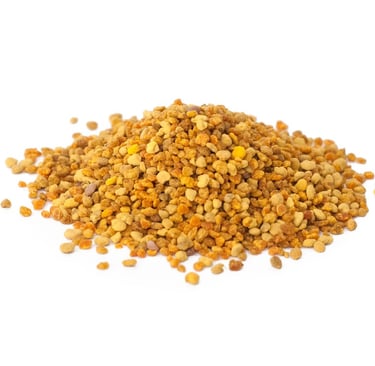ORDER YOUR BEE POLLEN TODAY


What is bee pollen and what is it good for?
There’s been a lot of buzz about bee pollen recently and it now highly regarded as one of natures best superfoods given it's rich nutrient profile, antioxidants and healthy vitamins.
What is Bee pollen?
Bee pollen is a small pellet consisting of flower pollen, digestive enzymes, beeswax, honey, and nectar by bees when foraging and pollinating flowers. They then take these little pellets back to their hives to turn into ‘bee bread’ to feed the colony.
However, beekeepers are able to safely harvest some of these pellets as the bees enter their hives and then preserve them immediately after harvest by drying or freezing them.
Why is in bee pollen a super food?
In terms of nutritional value, bee pollen is packed with over 250 active substances, including vitamins, minerals, and antioxidants. This includes vitamin E, vitamin A, vitamin D, and B1, B2, B6, and C, as well as essential acids like biotin and folic acid. According to Healthline, a tablespoon of these small yet mighty pellets have a nutritional composition of:
16 calories
0.24 grams of fat
1.2 grams of protein
2.18 grams of carbohydrates
250 types of nutrients, including vitamins and flavonoids
This makes them an excellent additional food supplement which may present several health benefits, as well as add extra protein to your meals.
What are the benefits of bee pollen?
Bee pollen has been used for medicinal purposes for centuries, starting in Tang Dynasty China. However, in recent years the supplement has become more popular with those in the Western world, and studies have started to be conducted to assess the benefits of bee pollen in humans. Whilst there is still work to be done, studies suggest that bee pollen might have the following benefits:
Inflammation relief and reduction of swelling
May help to lower cholesterol levels and blood lipids
Boosting liver health and protecting against disease
Provide further immune system health by fighting bacteria
Assistance with relieving menopause symptoms
Is bee pollen vegan?
Bee pollen is usually not considered vegan as it is harvested from bees. Generally, vegan lifestyles avoid any food or drink item that contains animal products, or uses animal labour. However, there is debate within the community about insect welfare, and the choice to eat bee pollen remains a personal one. Some vegans may regard bee pollen as acceptable, especially where the beekeeper is intending to help repopulate bee species and improve biodiversity as bee pollen is seen as a byproduct rather than exploitation. As such, whether it is regarded as vegan depends on your own ethical stance.
It should also be noted that whilst bee pollen is considered safe for most dietary requirements, it may not be suitable for allergy sufferers. Especially those who struggle with flower pollen, or if you suspect you may be allergic to bees, as consuming it may trigger a reaction. Bee pollen itself is not inherently dangerous, but you should consult with your doctor before taking it if you have any health concerns.
What is the best way to consume bee pollen?
Bee pollen is incredibly versatile and has a sweet flavour profile. It can be taken in capsule form for an easy incorporation into your daily diet, or it can be added to various foods and drinks to enhance taste whilst improving nutritional intake. Try the following methods if you’re in need of inspiration:
1. Use bee pollen granules as a sweet and crunchy topping for yoghurt or cereal
2. Add to coffee or tea as a sweetener to replace sugar, as bee pollen dissolves in hot water
3. Blend ground pollen or granules into a smoothie or add to an acai bowl
4. Sprinkle granules directly over salad for added texture
5. Incorporate ground pollen into a salad dressing such as a honey mustard
6. Sprinkle ground pollen over popcorn
7. Use granules as a garnish on top of dark chocolate or over chocolate spread on toast
8. Add it to your baked goods like banana bread, granola bars, and pastries.
Alternatively, you can choose to use bee propolis which offers similar benefits to bee pollen, but is more of a resin. In liquid form, water based propolis can be added into drinks or food without affecting the texture.


Frequently Asked Questions
What is bee pollen?
Bee pollen is a nutrient-rich substance collected by bees from flowers, known for its health benefits.
How is it sourced?
What are the health benefits?
How should I consume it?
You can add bee pollen to smoothies, yogurt, or salads for a nutritious boost to your diet.
All the products listed on our site are sourced ethically.
Bee pollen is known to boost energy, support immune function, and provide essential vitamins and minerals.
Quality
Sourcing the finest bee pollen products available in the UK.
Support
© 2025. All rights reserved.